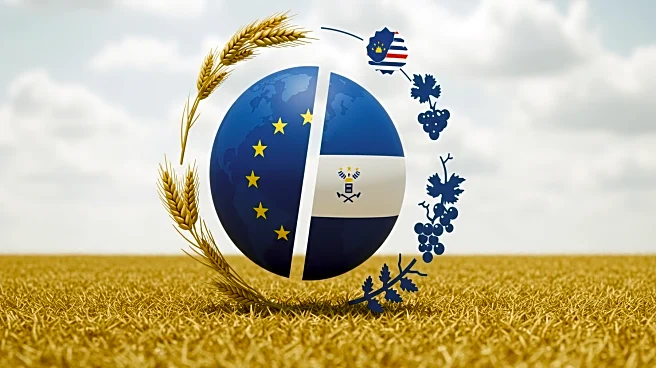What is the story about?
What's Happening?
Brazilian President Luiz Inácio Lula da Silva and French President Emmanuel Macron are working to finalize a trade agreement between the European Union and Mercosur. The negotiations, which have been ongoing for over two decades, aim to grant Mercosur economies privileged access to the European market, particularly in agriculture and livestock. However, Macron has expressed concerns that the agreement could harm French farmers, who may struggle to compete with South American producers. Despite these concerns, Macron is willing to support the pact if it includes protections for French agriculture. The agreement is seen as crucial for Brazil, especially after the U.S. imposed a 50% tariff on Brazilian exports, prompting Lula to seek new markets.
Why It's Important?
The potential EU-Mercosur trade agreement is significant for several reasons. For Brazil, it represents an opportunity to expand its agricultural exports and strengthen its position as a global supplier, especially in light of trade tensions with the United States. For the EU, the agreement could enhance economic ties with South America, but it also poses challenges for European farmers who fear increased competition. The negotiations highlight the complexities of European trade policy, where member states often prioritize national interests over collective EU goals. The outcome of these talks could have lasting impacts on international trade dynamics and agricultural markets.
What's Next?
The next steps involve continued negotiations to address the concerns of French agriculture while aiming to finalize the agreement by December, during the Mercosur summit in Brazil. If Macron and Lula reach a consensus, the agreement could be signed, but ratification in European parliaments may face opposition from those worried about its impact on local farmers. The discussions will likely continue to test the balance between national interests and broader trade objectives within the EU.
Beyond the Headlines
The negotiations underscore the tension between globalization and local economic protectionism. While the agreement could benefit major exporting economies, it raises ethical questions about the sacrifices made by smaller agricultural communities. The situation reflects broader debates on how trade policies should balance global economic integration with the preservation of local industries and ways of life.

















